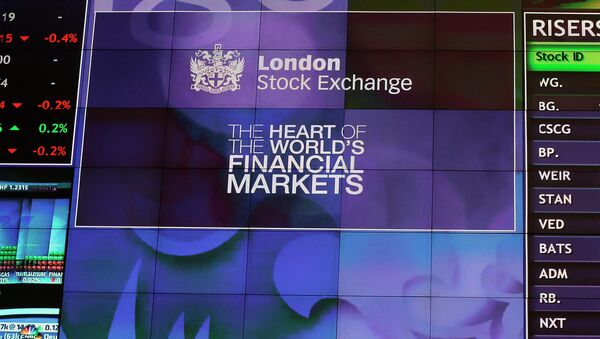Kristian Rouz — UK shares led the European rally in stock markets, while British governmental bonds also advanced, possibly reversing the global wave of fixed income depreciation after the market-friendly Conservatives defeated their main rival, the Labour party, in Thursday's UK general elections. The banking sector led the gains, as the earlier predictions of possible changes in the nation's economic policies in case of a Labour victory failed to come true. With exit-polls indicating the current PM David Cameron will govern the Albion for another five years, the rebound in stocks and bonds suggests the Conservative policies are rather accommodative for the overall economic expansion, albeit slow, but certain.
The pan-European FTSEurofirst Index rose 1.6%, with the British FTSE 100 up 1.8% as well. Banks posted biggest gains, with Lloyds adding 6.3% on the relief after the Labour defeat. The lefties were promising, had they won, to raise taxes for the financials. Utilities also gained on the same relief, with Centrica adding 6.9%. The Labour party pledged to freeze utility tariffs, a measure, hitting the businesses' viability.
With some 95% of the ballots counted, the British Conservatives have won 329 out of 650 parliamentary seats, extending their representation in the national legislature, while the Labour Party has won only 233 seats so far. The lefties' defeat is attributed mainly to their loss of Scotland, in favor of the local National party (SNP).
In London, 99 out of 100 stocks posted gains on FTSE 100. Beside Lloyds, two other major banks, Barclays and RBS, added over 4%. In telecommunications, Vodafone and BT Group rose over 1%. Hargreaves Lansdown, the retail middleman company, jumped by 5.5%.
During this week, the FTSE 100 Index added 0.4%, and is now up 6.9% this year. These gains are modest, however, compared to the gains in mainland European where the Euro Stoxx 50 jumped 14% this year. British stocks did not fare so well thus far partially because of the possible EU membership referendum and a consequent ‘Brexit', with the UK leaving the EU. However, with David Cameron in charge for the next five years, such an outcome is now less of a possibility, opening good growth prospects for the UK's stock market.
"The main issue was the potential instability of the final government," Vatsala Datta of the London branch of Royal Bank of Canada said. "That risk has been eliminated now. A lot of pent-up demand may emerge."
The Labour electoral victory would have depressed markets greatly, as the party would have offered different economic policy measures with an unknown possible main and side effects. Albeit Cameron's rule was not brilliant during past five years, his predictability is now more important for the economy than sensible, but risky, left-wing experiments.
The 2-year UK gilt yield lost one basis point, down to 0.53, after sinking as low as to 0.37 today. That means there is now less risk in the British market than prior to the tight election.



